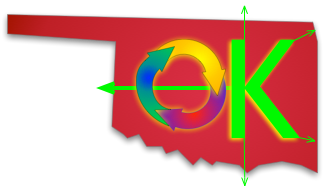DRAFT
Executive Order to enforce the Constitutions of Oklahoma and The United States of America to allow free markets to innovate transportation in Oklahoma;
- WHEREAS, liberty is the source of the general welfare through tolerance of individuals offering choices and the people sorting those choices in the Darwinian crucible of free markets and free speech; and,
- WHEREAS, the Boston Tea Party was a demonstration against a government transportation monopoly that triggered a war, Oklahoma’s Constitution forbids such monopolies; and,
Article II, Bill of Rights, SECTION II-32. "Perpetuities and monopolies are contrary to the genius of a free government, and shall never be allowed, nor shall the law of primogeniture or entailments ever be in force in this State."
- WHEREAS, the US Constitution is an enumerated powers document, where liberties and state sovereignties not enumerated as sacrificed to the Federal government, are retained by the people and states; and,
- WHEREAS, the US Constitution specifically forbids Federal taxing to build infrastructure beyond that required to defend free speech and mandates that every state be treated equally in commerce and infrastructure (post Roads and Ports Clauses); and,
[[Background:
Federalist #45: "The powers delegated by the proposed Constitution to the federal government are few and defined. Those which are to remain in the State governments are numerous and indefinite. The former will be exercised principally on external objects, as war, peace, negotiation, and foreign commerce; with which last the power of taxation will, for the most part, be connected. The powers reserved to the several States will extend to all the objects which, in the ordinary course of affairs, concern the lives, liberties, and properties of the people, and the internal order, improvement, and prosperity of the State."
There are 21 Presidential veto messages enforcing the "post Roads" restriction that states are sovereign over "internal improvements". ]]
- WHEREAS, Federal violation of the US Constitution implemented communications (President Wilson’s Executive Order July 22, 1918) and transportation monopolies (The Federal-Aid Highway Act of 1916) resulting in a century of rotary telephones and the 25 MPG efficiency of the Model-T; and,
- WHEREAS, Federal courts enforcing the US Constitution ended the Federal communications monopoly in 1982 resulting in millions of jobs innovating better communications at lower costs; and,
- WHEREAS, 46% of the 400+ ton-mpg railroads were abandoned since The Federal-Aid Highway Act of 1916 removed efficiency as a market force; and,
- WHEREAS, the Federal highway monopoly has blocked the digitizing of transportation networks that began in 1972 with the Personal Rapid Transit (PRT) network in Morgantown, WV; and,
[[Background:
Tricia Nixon opened the Morgantown PRT on Oct. 24, 1972. It is America's first network of self-driving cars. It is still operating today and has delivered 150 million passenger-miles with two minor injuries in 2016. In that same period of time, 1.8 million Americans died on roads.
Congressional Study "Automated Guideway Transit" PB-244854 (1975) documents how PRT networks could end American foreign-oil addiction and the hardships of the 1973 Oil Embargo. It warned of “institutional failures” within Federal management of infrastructure as a barrier to the spread of PRT.]]
- WHEREAS, the Federal highway monopoly created foreign oil addiction (7.2 million barrels/day week of May 17, 2019); and,
- WHEREAS, the highway bureaucracy ignored the calls to action by eight US Presidents to end foreign oil addiction and the sacrifice of soldiers buying time in oil-wars since 1991; and,
- WHEREAS, Oklahoma is sovereign over internal improvements, and all other aspects of welfare, under both the US and Oklahoma Constitutions; and,
- WHEREAS, Oklahoma regulation of Department of Labor, Amusement Ride Program has a safety record 10,000-times better than Federal highway safety (0.9 versus 11,200 injuries per million); and,
NOW, THEREFORE, BE IT RESOLVED that the State of Oklahoma shall grant Rights of Way access and regulate sustainable transportation networks based on the following metrics:
- Network construction must be privately funded.
- Networks must operate without government subsidies.
- Networks must exceed five times (5X) the efficiency of roads (greater than 125 mpg, cars average 24.6 mpg).
- Networks must pay 5% of their gross transportation revenues to the Rights of Way holders.
- Complying with existing Oklahoma regulations:
- Rights of Way, Oklahoma Constitution. Article. IX-2; Oklahoma Statutes Title Cities and Towns 11-36-101.
- Department of Labor, Amusement Ride Program
